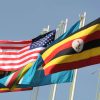Columnists
IOC: Ban Russia from Olympics
Russian athlete, won the women’s marathon event in the 2012 London Olympics. Now, the organizers of that event want her to refund the money that she won for it because the World Anti-Doping Agency (WADA), has confirmed that Russia sponsored a “comprehensive doping programme” for all its Olympians, both for London and the 2014 Winter Olympics held in Sochi, Russia, and maybe in earlier events.
Other athletes, not only from Russia, but any other country that is found to have been cheating, and will face such loss of honour and finances from sports endorsements.
WADA has recommended to the IAAF – the International Amateur Athletics Federation – that Russia be banned from participating in the 2016 Rio Olympics due in Brazil in a fortnight’s time. Within that time the International Olympic Committee (IOC), must come up with a decision on the matter.
IOC has now convened an urgent meeting to seek “legal advice” on WADA’s unequivocal approval because Russian President, Vladimir Putin, is putting up stiff resistance, vigorously arguing that WADA’s attitude is not a sporting, but a political ploy by the United States to damage Russia’s credibility and global standing. This is not borne by what has been found out.
Putin has put in a considerable effort and finances to developing and hosting sports events so as to be seen as the Russian president who cared about sports; he wants it to be his enduring legacy.
If Russia is banned, it will be a personal blow to Putin who spent more than $50 billion to host the Sochi Winter Olympics. For instance, for the London Olympics, Putin sent in 423 athletes of whom 86 won gold medals.
Outside a Moscow gym, where Olympic swimmers are putting in their final preparatory paces for Rio, there are posters planted all over the place, advising athletes not to get in any way involved in doping. These swimmers, and other intending Russian Olympians, see their presumed glory slipping away even before they step onto Brazilian soil.
As a result, Russia is belatedly showing that it is doing all possible to prevent doping and that it has been doing so even before this. By trying to convince the world that it is and has been serious against doping, Putin wants to put off the reproach that will follow his absence in Rio.
But this is not what American journalist, Rebecca Bruce, uncovered some years ago following a tip-off from a Russian whistleblower. It led to WADA’s probe and its recent report to IAAF.
WADA found out that the FSB – the Federal security service – the successor to the-then dreaded KGB spy organization of the Soviet era, had been actively and principally involved with the ministry of Sports, to falsify the doping tests of the athletes through “disappearing positive methodology”.
In this, the blood and urine samples of the doped athletes, was tampered with in a complicated set up in an attempt to fool the IAAF and IOC.
This comprehensive doping programme, under the state tutelage, has brought the Olympics to disrepute. To be sure, Russia is not alone in this deceit. Countries, such as Kenya, have had their share of IAAF reprimand and have taken measures to, including passing a law, to sanction athletes caught in the act.
Russia is resisting this, regarding it a blanket act against the country’s athletes, even though it has made its deputy minister of Sports to resign.
This is inadequate and too late. In any case, the IAAF decision has to be undertaken according to the administration of its rules on the participation of athletes in the sporting events.
What is more, in his individual capacity, the IOC president, Prof. Richard McClaren, is also of the view that Russia should be banned for the reasons discovered by WADA.
Opposing noises are now surfacing up to cloud this universal application and supporting Putin’s view against the sporting rules. If the IOC departs from the strict application of the rules, it risks damaging sports to the level that it will become a caricature dominated by drugs and cheats.
Comments














